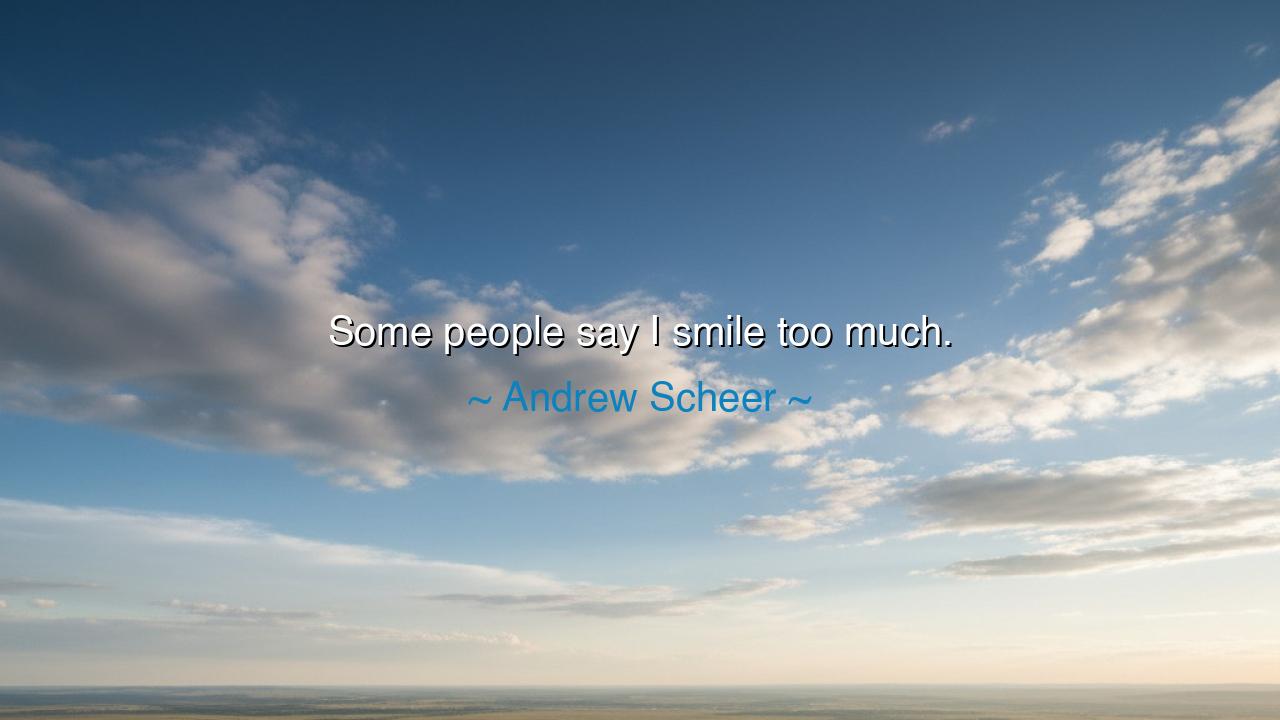
Some people say I smile too much.






Hearken, O seeker of wisdom, and reflect upon the words of Andrew Scheer: “Some people say I smile too much.” Within this seemingly simple statement lies a meditation on perception, resilience, and the power of positivity. For a smile, though often underestimated, carries profound influence over hearts, spirits, and the flow of human connection. To wear it freely is both an act of courage and a testament to one’s inner balance.
Since the earliest days, philosophers and sages understood the subtle strength of joy. Aristotle taught that moderation is virtue, yet he also recognized the power of expressions that elevate the soul. Scheer’s reflection embodies this ancient truth: a smile, though criticized or misunderstood, can be a beacon, a quiet signal of goodwill, composure, and hope, even in the face of scrutiny. To smile “too much” is, perhaps, only to smile beyond expectation, revealing an unwavering commitment to positivity.
Consider the life of Marcus Aurelius, emperor and philosopher. Even amidst wars, plagues, and betrayal, he cultivated calm and serenity in the eyes of those around him. His demeanor, often serene and composed, inspired confidence and trust. Like Scheer, he understood that outward expressions—whether frowned upon or praised—hold power to influence others, to convey resilience, and to create harmony amidst adversity.
There is a subtle heroism in smiling persistently. To meet criticism with joy, to maintain warmth and grace while others judge, requires inner strength. The ancients revered such balance, for it demonstrated mastery over emotion and the ability to wield positivity as a shield and a bridge. A smile, freely given, can disarm hostility, foster connection, and instill calm in uncertain times. Scheer’s willingness to smile, regardless of reproach, exemplifies this enduring virtue.
Even in modern history, the power of a smile is evident. Consider Mother Teresa, whose constant expression of compassion and warmth drew countless to her mission of service. Her smile was more than an expression; it was an instrument of influence, inviting trust, inspiring hope, and conveying a steadfast love for humanity. Scheer’s reflection reminds us that the simplest gestures—like a smile—can speak louder than words, transcending criticism and touching hearts.
The lesson is clear: one must not temper authenticity merely to appease the perceptions of others. Smiling, laughing, or expressing joy freely is not weakness but courage, and the consistency of such expression strengthens character, uplifts spirits, and shapes interactions positively. Criticism is inevitable, yet the decision to maintain openness and warmth reflects mastery of both self and circumstance.
From this reflection, practical counsel arises: cultivate your own capacity to smile, to uplift, and to remain composed in the face of scrutiny. Recognize that your expressions carry influence, whether in leadership, friendship, or community. Allow your smile to serve as a bridge, to foster trust and goodwill, even when others question its appropriateness. In doing so, you exercise agency, resilience, and empathy.
Thus, let each heart carry this ancient truth: the measure of expression is not in its moderation but in its sincerity. Andrew Scheer reminds us that to smile freely, even when judged, is to wield a quiet power, a force for connection, joy, and courage. In the constancy of such gestures, the soul demonstrates its strength, illuminating the path for oneself and for all who witness it.
If you wish, I can also craft a short, audio-ready version of this reflection, rhythmically structured with emotional rises and pauses to make it engaging and memorable as a narrated story. Do you want me to create that version?






AAdministratorAdministrator
Welcome, honored guests. Please leave a comment, we will respond soon